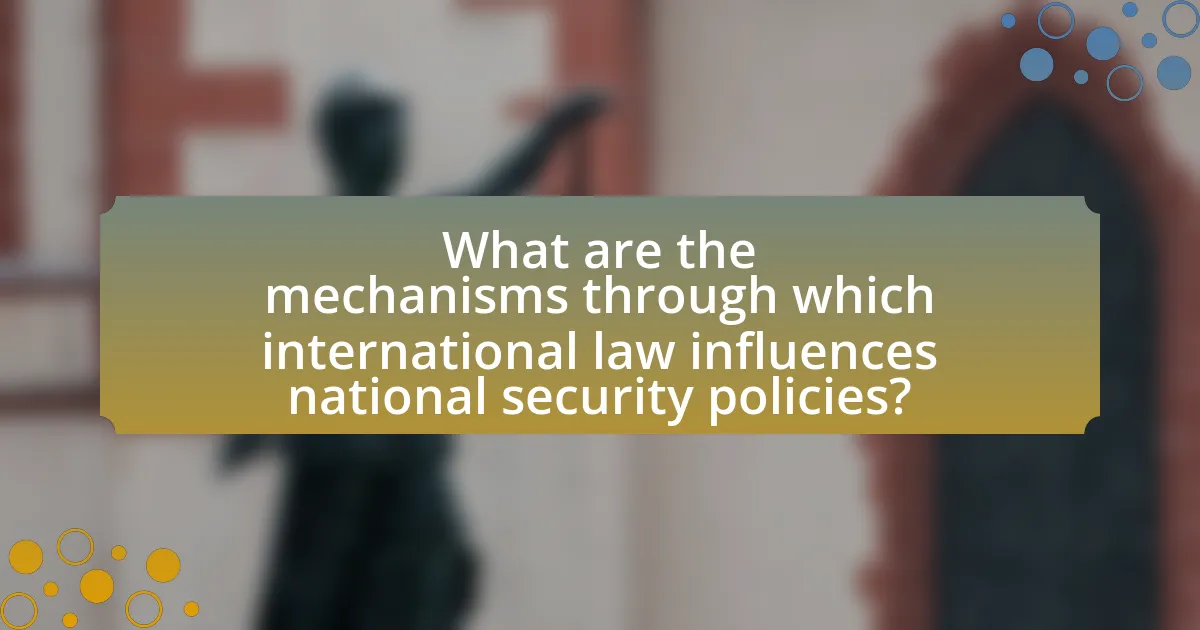The article examines the influence of international law on national security policies, highlighting how legal frameworks shape state behavior in matters of war, peace, and human rights. It discusses key principles such as state sovereignty, non-intervention, and self-defense, as well as the role of treaties and conventions in guiding national security strategies. The article also addresses the challenges of integrating international law into national security policies, the implications of non-compliance, and the importance of accountability mechanisms. Additionally, it explores current trends, including the adaptation of international law to emerging security threats like cyber warfare and the impact of regional agreements on national security strategies.

What is the Influence of International Law on National Security Policies?
International law significantly influences national security policies by establishing legal frameworks that govern state behavior in matters of war, peace, and human rights. For instance, treaties such as the United Nations Charter obligate states to refrain from the use of force against other states, thereby shaping national defense strategies and military engagements. Additionally, international humanitarian law, including the Geneva Conventions, sets standards for the conduct of armed conflict, compelling nations to adhere to principles that protect civilians and combatants alike. This legal oversight can limit a state’s actions during conflicts and promote accountability for war crimes, as seen in various international tribunals. Thus, international law not only guides the formulation of national security policies but also holds states accountable to the global community, reinforcing the importance of legal norms in international relations.
How does international law shape national security frameworks?
International law shapes national security frameworks by establishing legal norms and obligations that states must adhere to in their security policies. These laws, such as the United Nations Charter and various treaties, dictate permissible actions in conflict, human rights protections, and the conduct of military operations. For instance, the principle of proportionality in international humanitarian law requires that military actions must not cause excessive civilian harm relative to the anticipated military advantage, thereby influencing how nations plan and execute their security strategies. Additionally, international law promotes cooperation among states through treaties and agreements, which can enhance collective security measures, as seen in NATO’s mutual defense commitments. This legal framework not only constrains state behavior but also provides mechanisms for accountability, thereby shaping national security policies in a manner that aligns with global standards and expectations.
What are the key principles of international law relevant to national security?
The key principles of international law relevant to national security include the principles of state sovereignty, non-intervention, self-defense, and the protection of human rights. State sovereignty asserts that nations have the authority to govern themselves without external interference, which is foundational to national security. The principle of non-intervention prohibits states from intervening in the internal affairs of other states, thereby maintaining stability and security. Self-defense allows nations to take necessary actions to protect themselves against armed attacks, as outlined in Article 51 of the United Nations Charter. Lastly, the protection of human rights emphasizes that national security measures must respect individual rights and freedoms, ensuring that security policies do not violate international human rights standards. These principles collectively guide how nations formulate their security policies while adhering to international obligations.
How do treaties and conventions impact national security policies?
Treaties and conventions significantly shape national security policies by establishing legal frameworks that govern state behavior and cooperation in security matters. These international agreements often require countries to align their domestic laws and practices with agreed-upon standards, which can lead to enhanced security measures, intelligence sharing, and joint military operations. For instance, the North Atlantic Treaty Organization (NATO) treaty obligates member states to mutual defense, thereby influencing their national defense strategies and resource allocations. Additionally, arms control treaties, such as the Treaty on the Non-Proliferation of Nuclear Weapons (NPT), compel nations to commit to non-proliferation efforts, impacting their military capabilities and strategic planning. Thus, treaties and conventions serve as critical instruments that not only guide national security policies but also foster international stability and cooperation.
Why is the relationship between international law and national security important?
The relationship between international law and national security is important because it establishes a framework for states to address security threats while adhering to legal norms. International law provides guidelines for the use of force, the treatment of prisoners, and the protection of human rights, which are essential for maintaining legitimacy and stability in international relations. For instance, the United Nations Charter regulates the use of force, allowing military action only in self-defense or with Security Council authorization, thereby preventing arbitrary actions that could escalate conflicts. This legal framework helps to balance state security interests with global peace and security, promoting cooperation among nations and reducing the likelihood of conflict.
What are the implications of ignoring international law in national security?
Ignoring international law in national security can lead to significant diplomatic repercussions and undermine global stability. When a nation disregards established legal frameworks, it risks alienating allies and provoking adversaries, which can escalate conflicts. For instance, the U.S. invasion of Iraq in 2003, deemed illegal by many international observers, resulted in long-term regional instability and strained relations with various countries. Additionally, ignoring international law can erode the legitimacy of a nation’s actions, making it difficult to garner support for future security initiatives. This pattern can also encourage other states to act similarly, leading to a breakdown of international norms and increased global insecurity.
How does compliance with international law enhance national security?
Compliance with international law enhances national security by fostering stability and predictability in international relations. When nations adhere to established legal frameworks, they reduce the likelihood of conflicts, as mutual respect for laws such as treaties and conventions promotes diplomatic dialogue over military confrontation. For instance, the United Nations Charter, which outlines principles of peaceful coexistence, has been instrumental in preventing wars between states. Additionally, compliance with international law can lead to stronger alliances and partnerships, as countries that respect legal norms are often viewed as more reliable and trustworthy. This trust can facilitate cooperation on security issues, such as counter-terrorism and arms control, ultimately contributing to a more secure global environment.

What are the mechanisms through which international law influences national security policies?
International law influences national security policies through mechanisms such as treaty obligations, customary international law, and judicial decisions. Treaty obligations, like the United Nations Charter, require states to adhere to collective security measures, thereby shaping national defense strategies. Customary international law, which evolves from consistent state practice and legal norms, guides nations in their military engagements and humanitarian considerations during conflicts. Judicial decisions from international courts, such as the International Court of Justice, provide legal interpretations that can compel states to modify their national security policies to comply with international standards. These mechanisms collectively ensure that national security policies align with global legal frameworks, promoting accountability and cooperation among states.
How do international organizations contribute to national security policies?
International organizations contribute to national security policies by facilitating cooperation among states, establishing norms, and providing frameworks for conflict resolution. For instance, the United Nations plays a crucial role in promoting collective security through peacekeeping missions and resolutions that encourage member states to adhere to international law. Additionally, organizations like NATO enhance national security by providing a collective defense mechanism, as outlined in Article 5 of the North Atlantic Treaty, which states that an armed attack against one member is considered an attack against all. This collective approach not only deters aggression but also fosters diplomatic dialogue, thereby reinforcing stability and security among nations.
What role do the United Nations and NATO play in shaping national security?
The United Nations (UN) and NATO play crucial roles in shaping national security by providing frameworks for international cooperation and collective defense. The UN facilitates dialogue and conflict resolution through peacekeeping missions and diplomatic efforts, while NATO offers a military alliance that ensures member states’ defense against external threats, exemplified by Article 5, which commits members to mutual defense. Historical instances, such as NATO’s intervention in the Balkans during the 1990s and the UN’s peacekeeping operations in various conflict zones, demonstrate their effectiveness in maintaining stability and security on a global scale.
How do regional agreements affect national security strategies?
Regional agreements significantly shape national security strategies by fostering cooperation among member states, enhancing collective defense mechanisms, and establishing frameworks for conflict resolution. For instance, NATO’s collective defense clause obligates member countries to respond to an attack on any member, thereby directly influencing their national security policies to align with collective interests. Additionally, regional agreements often lead to intelligence sharing and joint military exercises, which further integrate national security strategies within the regional context. The European Union’s Common Security and Defence Policy exemplifies how regional frameworks can lead to coordinated responses to security threats, thereby reinforcing the interconnectedness of national security strategies among member states.
What are the challenges of integrating international law into national security policies?
Integrating international law into national security policies presents several challenges, primarily due to conflicting legal frameworks and national interests. States often prioritize their sovereignty and security over international obligations, leading to selective compliance with international law. For instance, the United States has faced criticism for its counterterrorism practices, which some argue violate international human rights standards. Additionally, the lack of enforcement mechanisms for international law complicates adherence, as countries may disregard treaties without facing significant repercussions. Furthermore, differing interpretations of international law among nations can create inconsistencies in policy implementation, hindering cooperative security efforts. These challenges underscore the complexities involved in aligning national security strategies with international legal norms.
What conflicts arise between national interests and international obligations?
Conflicts between national interests and international obligations often arise when a state’s pursuit of self-interest undermines its commitments to international treaties or agreements. For example, a country may prioritize its economic growth by exploiting natural resources, which can violate international environmental agreements. The Paris Agreement, aimed at combating climate change, exemplifies this tension; nations may resist emissions reductions to protect their economic interests, leading to non-compliance with their international commitments. Additionally, national security concerns can prompt states to bypass human rights obligations, as seen in counter-terrorism measures that infringe on civil liberties, conflicting with international human rights treaties. These examples illustrate how the drive for national advantage can clash with the responsibilities that come from international law.
How do differing interpretations of international law affect national security?
Differing interpretations of international law significantly impact national security by creating ambiguity in legal obligations and responsibilities. When states interpret international law differently, it can lead to conflicting actions, such as military interventions or sanctions, which may escalate tensions and provoke conflicts. For instance, the varying interpretations of the United Nations Charter regarding the use of force have led to divergent national policies, as seen in the NATO intervention in Libya in 2011, which some states viewed as a legitimate humanitarian intervention while others considered it a violation of sovereignty. This inconsistency can undermine collective security efforts and create an environment where states feel compelled to act unilaterally, thereby increasing the risk of international instability and insecurity.

What are the current trends in the influence of international law on national security policies?
Current trends indicate that international law increasingly shapes national security policies through frameworks that emphasize human rights, humanitarian law, and collective security. Nations are adopting policies that align with international treaties, such as the United Nations Charter, which promotes the responsibility to protect civilians and prevent atrocities. For instance, the rise of international legal norms regarding cyber warfare and the regulation of armed conflict reflects a growing recognition of the need for accountability and adherence to legal standards in national security strategies. Additionally, the integration of international law into counter-terrorism efforts demonstrates a trend where states are compelled to balance security measures with compliance to human rights obligations, as seen in the implementation of the Global Counter-Terrorism Strategy by the UN. These developments underscore the increasing interdependence between international legal standards and national security frameworks.
How is international law adapting to new security threats?
International law is adapting to new security threats by incorporating frameworks that address issues such as cyber warfare, terrorism, and transnational crime. For instance, the United Nations has developed resolutions and conventions, such as the 2001 UN Global Counter-Terrorism Strategy, which emphasizes international cooperation and legal measures to combat terrorism. Additionally, the emergence of cyber threats has led to the establishment of guidelines by organizations like the NATO Cooperative Cyber Defence Centre of Excellence, which outlines legal norms for state behavior in cyberspace. These adaptations reflect a recognition of the evolving nature of security challenges and the need for legal mechanisms that can effectively respond to them.
What role does cybersecurity play in the context of international law and national security?
Cybersecurity plays a critical role in the context of international law and national security by establishing frameworks for protecting state sovereignty and ensuring the integrity of national infrastructure. International law, including treaties and conventions, addresses cyber threats by promoting cooperation among nations to combat cybercrime and enhance collective security. For instance, the Budapest Convention on Cybercrime facilitates international collaboration in investigating and prosecuting cyber offenses, thereby reinforcing national security. Additionally, the United Nations has recognized cybersecurity as a vital component of global peace and security, emphasizing the need for states to develop robust cybersecurity strategies to protect against malicious cyber activities that can undermine national interests.
How are emerging technologies influencing international legal frameworks for security?
Emerging technologies are significantly influencing international legal frameworks for security by necessitating updates to existing laws and the creation of new regulations that address issues such as cybersecurity, artificial intelligence, and autonomous weapons. For instance, the rise of cyber threats has prompted international bodies like the United Nations to develop guidelines and frameworks aimed at enhancing cybersecurity cooperation among nations. Additionally, the use of artificial intelligence in military applications raises ethical and legal questions, leading to discussions within forums such as the Convention on Certain Conventional Weapons, which seeks to establish norms for the use of autonomous weapons systems. These developments illustrate how technological advancements compel legal adaptations to ensure security measures remain effective and relevant in a rapidly changing landscape.
What best practices can nations adopt to align their security policies with international law?
Nations can adopt best practices such as integrating international law into national legislation, conducting regular training for security personnel on legal standards, and establishing oversight mechanisms to ensure compliance. By incorporating international treaties, such as the Geneva Conventions, into domestic law, nations create a legal framework that guides security operations. Regular training programs for military and law enforcement personnel on human rights and international humanitarian law ensure that security practices align with legal obligations. Furthermore, independent oversight bodies can monitor security operations, providing accountability and transparency, which reinforces adherence to international law. These practices collectively enhance the legitimacy and effectiveness of national security policies while ensuring compliance with international legal standards.
How can nations effectively balance sovereignty and international obligations?
Nations can effectively balance sovereignty and international obligations by establishing clear legal frameworks that prioritize both national interests and compliance with international law. This involves creating domestic laws that align with international treaties and agreements, ensuring that national policies do not violate international norms. For instance, countries that ratify the Paris Agreement on climate change must implement policies that reduce greenhouse gas emissions while considering their economic and social contexts. Additionally, nations can engage in diplomatic negotiations to address conflicts between sovereignty and international obligations, allowing for flexibility and mutual understanding. Historical examples, such as the establishment of the International Criminal Court, demonstrate how nations can cooperate on global issues while maintaining their sovereignty through negotiated agreements that respect both national and international legal standards.
What strategies can enhance compliance with international law in national security policies?
Strategies that can enhance compliance with international law in national security policies include the integration of legal frameworks into national legislation, the establishment of accountability mechanisms, and the promotion of international cooperation. Integrating international legal standards into national laws ensures that security policies align with global norms, as seen in countries that have adopted the Rome Statute to govern military conduct. Establishing accountability mechanisms, such as independent oversight bodies, can deter violations by holding officials responsible for unlawful actions, which is evidenced by the effectiveness of such bodies in various democracies. Additionally, promoting international cooperation through treaties and multilateral agreements fosters a shared commitment to uphold international law, as demonstrated by the collective security arrangements in NATO, which emphasize adherence to legal obligations in military operations.


